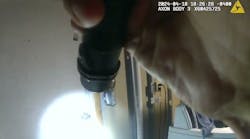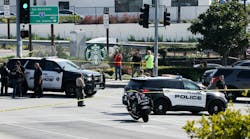It's 0800 hours and you have just walked out of roll call. As you look for your assigned vehicle to load up and begin your tour, dispatch calls your unit number and assigns your first call of the day. The caller, who works as administrative staff at the local Jewish Center arrived for work and noticed an unoccupied car near the front entrance. The caller was concerned the car might be broken down and it could block the bus drop off point for the day care. Minutes later you arrive and approach the empty vehicle. As you get near the car your sixth sense immediately kicks into high gear and intuitively you know something is horribly wrong. Your mind momentarily flashes back to a news story you saw last night where a car bomb blew up in Spain killing 70 and injuring another 100. You wonder; "...could this be just another disabled vehicle or a Vehicle Borne Improvised Explosive Device?" How would you know?
As a First Responder it's your job to know, and at a minimum you should at least know how to react to the threat. The prospect of using a car as the delivery means for an explosive device is as old as Henry Fords Model A itself. The trouble is the frightening statistics revealed within recent years highlighting the increased use of car bombs by terrorists. The effectiveness of Improvised Explosive Devices (IEDs) were so significant in Iraq that it was the leading cause of death and destruction imposed on Coalition Forces during tactical operations. What's the bottom line? Car bombs work and they produce big results. Here's why terrorists use them:
- Large amounts of explosives can be concealed within them.
- Highly mobile; easy to deploy.
- They have their own power-supply, switches, combustible material (fuel) and fragmentation (metal body).
- Vehicles are common - everyone expects them to be around; even unoccupied.
- Can be delivered by proxy (driver delivers because they have been threatened or were unaware of the contents).
- Command detonated either by wire, remotely and in some cases by timer.
- Detonation generates intense media coverage.
Realizing that car bombs are considered the "weapon of choice" for terrorists, you should condition your mind to look for clues that may indicate the presence of a Vehicle Borne Improvised Explosive Device, or VBIED. As a good, progressive, cop you already know that "things may not always be what they seem". However, if you have never been taught what to look for, or lack the appropriate experience or mindset, then typically you start viewing things as to how they are presented. That's dangerous; not only for you but for everyone else you are sworn to protect. The following are proven indicators when a car bomb may be present:
- Grease or dirt marks around compartment areas that could point to the vehicle having undergone modifications (ie., engine area, fuel tank, undercarriage, etc.).
- Weight distribution - Engine or trunk area appear too heavy for the norm? Is the suspension weighted down?
- Any unusual chemical or gaseous type odors in or around the vehicle?
- Unknown leaking substances, contrary to the norm or typical, in or around the out of view compartments of the car.
Apart from using direct observation to accumulate possible physical evidence, employ your policing analytical skills to determine the following:
- Where is the vehicle parked in relation to a potential target (ie., near front doors, public access or gathering point, etc.)
- Is the location of any political, religious or ideological significance, such as a place of worship - regardless of denomination, government center or school?
- Previously identified critical infrastructure target from the U.S. Dept. of Homeland Security (ex., financial district, military installation, energy facility, airport or transit center, etc.)
- Ask yourself, "What would make this location, time or date especially harmful if this vehicle is a car bomb?" Start thinking like a terrorist in order to defeat one.
Based on the scenario at the beginning of this article, let's assume that you do suspect you have located a car bomb. Now what? Using the military guidelines having proved themselves in Iraq, FOLLOW THE 4 C's!
Clear - Leave the immediate area and expect an imminent detonation.
Cordon - Establish safe evacuation distances and be familiar with the Bureau of Alcohol Tobacco and Firearms Explosives Standards (linked below) to know how far to place your barriers at a minimum.
Control - Using binoculars from a safe distance, maintain visual surveillance of the vehicle to ensure security of the scene remains unchanged.
Call - Your local bomb squad. As the first responder your job is the immediate protection of lives and securing the scene, until specialist assets arrive to render the location safe.
All the training and knowledge accumulation in the world will not keep you or your community safe if you or your agency suffers from the it won't happen here mindset. Threat recognition begins with realization leading to actualization. First responders (Police, Private and Corporate Security, Fire and EMS) have always been and will continue to be at the anti-terrorism tip of the spear. It's time we started acting like it.


